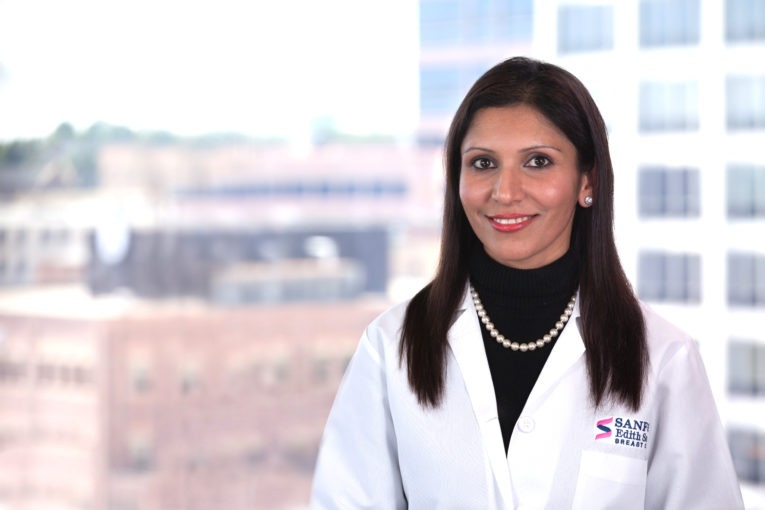BEMIDJI, Minn. –- Every day doctors around the world discover ways to slow the spread of and, in some instances, cure the various forms of cancer.
While much of that work happens at large, urban universities and health care systems, Jasmine Kamboj, M.D., along with her team of oncologists and staff, chases new techniques and treatments for her own northern Minnesota patients at Sanford Bemidji.
“In my world, even if you have one person whose life is saved, or who receives another one or two years of life, that’s a big deal to me,” she said of the clinical trials used search for solutions.
Bemidji is a relatively remote community setting, yet Sanford Health constantly adds to its clinical trial offerings that could open the door for more effective treatment of cancers and their side effects and improve people’s lives. Currently, Sanford Health oncology can accrue eligible patients on 59 clinical trials, and that list continues to grow.
Some of the trials are conducted by oncology groups, some by pharmaceutical companies and some by local providers. No matter the source, the goal of each trial is to improve cancer outcomes.
“We have clinical trials open for most of the cancers treated at Sanford Health. We are also taking measures to abate the adverse effects from chemotherapy,” Dr. Kamboj said.
Among the clinical trials helping to reduce negative side effects of chemotherapy is one Dr. Kamboj introduced. It involves putting ice packs on the hand and foot of patients who receive a neurotoxin during the treatment. The side effects normally include tingling and numbness in the extremities and impaired functionality.
“If I’m treating a 45-year-old breast cancer patient which, unfortunately, is not that uncommon these days, it’s not fun to give her a neurotoxin because our hope and our aim is to give her a normal life expectancy,” Dr. Kamboj said. “There was a trial which gave 40 women a frozen glove and a frozen sock on one side (during the chemo treatments). After 12 weeks of chemo the hand and foot (treated with the cold packs) were 60 to 70 percent better in the reduction of the tingling, numbness and functionality.”
Dr. Kamboj improvised similar trials with other patients and the results were amazing.
“I started (her trials) in November, and not just for breast cancer patients but also for other women getting the neurotoxic agents, and I had marvelous results,” she said. “Most of them didn’t have a speck of neurotoxicity side effects. And that means that they didn’t have to receive all of the drugs to treat neurotoxicity, which are not without their own side effects.
“That is a huge difference to their quality of life, their pocketbooks and the pocketbooks of the entire nation,” Dr. Kamboj added.
Enrolling
Patients who’d like to participate in a clinical trial at Sanford Bemidji (or elsewhere in Sanford Health) are welcome to enroll. Staff will then determine if there is an appropriate clinical trial for the patient and if the person qualifies. The patient will then be informed of any risks and benefits of taking part in the study as well as the treatments and tests that will be provided.
“We will lay our cards on the table and the patient is the one who will say ‘Yay’ or ‘Nay’,” Dr. Kamboj said. “The patient, absolutely, is the boss and can change their mind at any time.”
Every clinical trial result provides important information and, ultimately, will help smooth the road for cancer patients.
“Clinical trials are giving us answers,” Dr. Kamboj said. “They not only are helping increase survival and curing some cancers, the trials are also improving supportive care and preventing some side effects from happening altogether. And that is huge for a patient’s longevity.”
Getting attention
Dr. Kamboj, originally from India, attended medical school at Armed Forces Medical College and did her residency at Rosalind Franklin University of Medicine and Science in Chicago. She has produced a number of articles related to her work at Sanford Health, and two of the pieces have been accepted for publication by the American Society of Clinical Oncology (ASCO), the largest oncology institution in the world.
“To get two through that type of selection process is a meaningful thing,” Dr. Kamboj said.
One of the articles centered on precision oncology in which tests are run on a cancer tumor, the set of mutations and on markers that may or may not be present.
The other article compares the clinical trials currently being done at Sanford Bemidji to those conducted at larger Sanford Health sites such as Fargo and Bismarck in North Dakota and Sioux Falls, South Dakota.
“And we are doing well,” Dr. Kamboj said. “We are appealing ASCO and other bigger societies that, ‘Hey! Even though we are small and remotely placed, we have the capacity to enroll say 30 more patients to the trials which could save peoples’ lives and which are going to be meaningful.’
“This is important because we, as providers, want to give the best care to the patients. And it is important to the patients because that may be their only chance for survival. It also is important to ASCO because they don’t want to exclude people like us who are relatively remote and under-represented in big clinical trials.”
More
- Diabetes study: Life in a clinical trial as a teenager
- Clinical trial for type 1 diabetes reaches milestone
- Podcast: Clinical trials and cancer care near home
- FDA-approved clinical trial tests stem cells to heal wounds
…
Posted In Cancer, Health Information, Research, Women's
